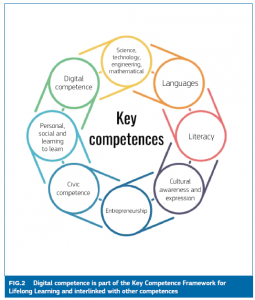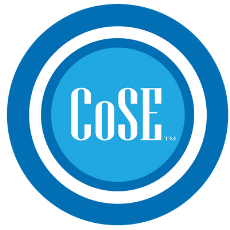Written by: Vanessa Julia Ciconte
Reading time: 5 minutes
DigiComp 2.2 Framework
In today’s digital world, building and promoting technological competencies is crucial. Earning such skills helps ensure equal job opportunities in the realm of learning and working culture. But which method should be used to build such specialized abilities, while shaping confident, responsible, and critical individuals at the same time? The DigiComp Framework issued by the European Policy Agenda (2020) represents the solution to this concern.
What is the aim of the DigiComp Framework?
- Mastering Information; the endpoint of the process involves being able to browse and organize data and information online. Being able to evaluate the relevance of cited sources and digital content is also crucial.
- Promoting Communication and Collaboration; Responsible and attentive communication is important in the realm of diversity and cultural background. Furthermore, communication and collaboration are important elements that build civic involvement and participatory citizenship nowadays.
- Guiding the Content Creation Process; Involves being aware of how licenses are issued and how copywriting works. Furthermore, it concerns knowing how to use technological devices to produce bodies of knowledge and how programming works.
- Ensuring Safety Online; Protecting the technological devices used is crucial and needs to be fostered. This includes personal data and privacy. Indeed, this realm must be further extended to socially inclusive and well-being environments. By doing so, many factors are protected: devices, personal data, privacy, health and well-being, and the environment.
- Enhancing a Problem-Solving Attitude; Being able to spot problems and solutions is a valuable skill. Using digital tools and technological devices enhances and speeds up this process.

Digital Key Competences
(European Commission 2023).
From the above-mentioned index, there is a list of twenty-one skills that can result from these areas, with more than two hundred fifty instances where these principles can be concretely applied today. But first, let’s summarize the key competencies:
(Vuorikari, et al. 2022: 5).
The next session is focused on providing one example for each competence, with a large focus on instances and situations that may occur today in an employment scenario.
- Mastering Information. “I can identify how and where to organize and keep track of job ads in a job app of my smartphone in order to retrieve them when I need them along my job seeking” (Vuorikari, et al. 2022: 14)
- Promoting Communication and Collaboration. “I can propose and use different media strategies to empower citizens of my city to participate in defining the main topics of an event on the use of sugar in food production” (ibid: 20).
- Guiding the Content Creation Process. “I can tell a colleague with image banks I usually use to find images that I can download free of charge for a brief tutorial video on a new procedure for my organization’s staff” (ibid: 32).
- Ensuring Safety Online. “I can create a digital campaign of possible health dangers of using Twitter for professional reasons (e.g. bullying, addictions, physical well-being) which can be shared and used by other colleagues and professionals on their smartphones or tablets” (ibid: 40).
- Enhancing a Problem-Solving Attitude. “I can fix problems such as identifying that I am introducing a question or comment in the wrong place” (ibid: 49).
Moving on to the next section, we will explore tangible examples of how the DigiComp Framework can be used in a learning scenario:
- Mastering Information. “I can identify, from a list in my textbook of blog and digital databases containing available literature, those that are commonly used because they are credible and reliable” (Vuorikari, et al. 2022: 12).
- Promoting Communication and Collaboration. “I can use the most appropriate digital resources in order to create a video related to the work on my tablet with my classmates. I can also differentiate between appropriate and inappropriate digital resources to create this video and work in a digital environment together with my classmates” (ibid: 22).
- Guiding the Content Creation Process. “I can fix problems such as identifying the symbol that indicates that an image is copyrighted and therefore cannot be used without the author’s permission” (ibid: 32).
- Ensuring Safety Online. “I can create a blog on cyberbullying and social exclusion for my school’s digital learning platform, which helps my classmates to recognize and face up to violence in digital environments” (ibid: 40).
- Enhancing a Problem-Solving Attitude. “I can engage in exercises of the MOOC that use simulations to practice a math problem that I failed to solve correctly at school” (ibid: 50).
Ultimately, the aim of the DigiComp Framework is to empower youth with a wide range of both technical and practical skills that keep up with today’s digital world demands and prepare the recipients for possible future challenges.
![]()
“Meet Vanessa, a passionate person committed to positively impacting the world and the people around her. With a background in Political Science, Urbanistics, and Human Geography, Vanessa can bring a wealth of knowledge and expertise. Her diverse heritage and cultural background, with Italian and Romanian roots, contribute to her distinctive perspective and worldview. Her life’s passions are embarking on journeys around the world, exploring new destinations and cultures, and taking part in on-field projects. Furthermore, Vanessa’s primary interest lies in migration, rethinking sustainable societies, comparative politics, and public affairs.
In addition to her professional background, Vanessa firmly believes in the power of collaboration and teamwork. She advocates for sustainable and affordable housing, extended and equal education access, and immigrants and refugee rights; she has worked alongside inspiring individuals to amplify the impact. Vanessa is thrilled to join the CoSE team, where she can combine her skills, passion, and dedication to drive meaningful change while helping overlooked communities and individuals to thrive.”
Bibliography
European Commission (2023). DigComp: The European Digital Competence Framework. Retrieved from https://joint-research-centre.ec.europa.eu/digcomp/digcomp-framework_en. Consulted on November 27, 2023.
Vuorikari, R., Kluzer, S., & Punie, Y. (2022). The Digital Competence Framework for Citizens: With New Examples of Knowledge, Skills and Attitudes.
